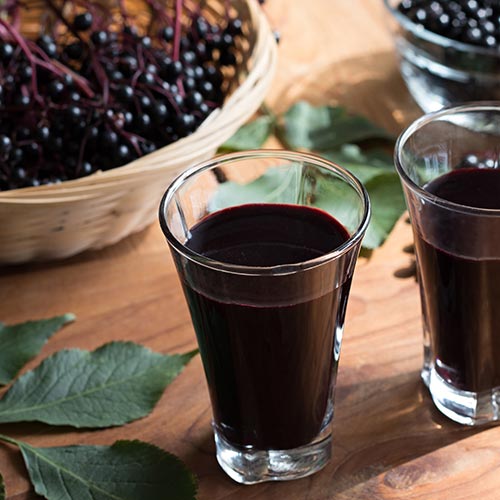Elderberries: A natural Cold and Flu Remedy
- by Dr. Jeffery Campbell
-
in Blog
-
Hits: 7053
Chiropractic patients are always asking if there are natural ways to protect yourself from the cold and influenza viruses. Elderberry has been used for thousands of years in folk medicine to treat influenza, colds and sinusitis, and has been reported to have antiviral activity against influenza and herpes simplex. Elderberries are thought to prevent or shorten the duration of herpes outbreaks, decrease pain and inflammation, and reduce symptoms of upper respiratory infections.
Many people consider the elderberry plant as powerful for preventing and treating colds as well as influenza and swear by its antiviral properties. Published studies have found that elderberries do have significant benefits against cold and influenza symptoms.
In a placebo-controlled, double-blind study, 93.3% of the people taking an elderberry preparation reported significant improvement in influenza symptoms within 2 days of starting it, compared with the 6 days it took for the placebo group to see improvement.
In a randomized, double-blind, placebo-controlled study, researchers gave either a placebo (fake) syrup or elderberry syrup to patients who reported having flu-like symptoms for less than 48 hours. On average, the patients who received the elderberry syrup saw relief of symptoms 4 days earlier than the group that received the placebo syrup. Additionally, the patients in the elderberry syrup group reported taking significantly fewer over-the-counter medications for symptom relief.
Another randomized, double-blind placebo-controlled clinical trial of 312 economy class passengers to investigate if a standardized membrane filtered elderberry (Sambucus nigra L.) extract has beneficial effects on physical, especially respiratory, and mental health. Their data found a significant reduction of cold duration and severity in air travelers.
Researchers also have found that people who have taken elderberries have higher levels of antibodies against the influenza virus, thus it may also be able to prevent influenza infection.
So what is in these elderberries? They are high in antioxidants (flavonoids) but they also contain a protein called hemagglutinin. This protein has been shown to stop virus capability to replicate by inhibiting its ability to enter the cell… like locking the front door to the cell. If elderberries are taken after infection, it can keep the virus from spreading, which reduces the duration of influenza symptoms, but if taken before initial exposure it can prevent the virus from causing infection.
But doc, are elderberries safe? It seems that the elderberry plant is generally safe for most people, however it has been reported that eating the raw seed can lead to nausea and vomiting. So elderberry syrup is preferred, and elderberry syrups are easy to find. According to the conclusions of one study, “Elderberry extract seems to offer an efficient, safe and cost-effective treatment for influenza.”
Need chiropractic care? Let the Spinal Health Center of Gladstone take care of you! 816-436-1500.
References
- Zakay-Rones Z, Varsano N, Zlotnik M, et al. Inhibition of several strains of influenza virus in vitro and reduction of symptoms by an elderberry extract (Sambucus Nigra L.) during an outbreak of Influenza B Panama. J Altern Complement Med. 1995;1(4):361–9.https://www.ncbi.nlm.nih.gov/pubmed/9395631
- Zakay-Rones Z, Thom E, Wollan T, Wadstein J. Randomized study of the efficacy and safety of oral elderberry extract in the treatment of Influenza A and B virus infections.” J Int Med Res. 2004;32(2):132-40.https://www.ncbi.nlm.nih.gov/pubmed/15080016
- Evelin Tiralongo,1,2,* Shirley S. Wee,2,3 and Rodney A. Lea. Elderberry Supplementation Reduces Cold Duration and Symptoms in Air-Travelers: A Randomized, Double-Blind Placebo-Controlled Clinical Trial Nutrients. 2016 Apr; 8(4): 182.https://www.ncbi.nlm.nih.gov/pmc/articles/PMC4848651/
- Roschek Jr. B, Fink RC, McMichael MD, Li D, Alberte RS. Elderberry flavonoids bind to and prevent H1N1 infection in vitro. Phytochemistry. 2009;70(10):1255-61. doi: 10.1016/j.phytochem.2009.06.003.https://www.ncbi.nlm.nih.gov/pubmed/19682714


